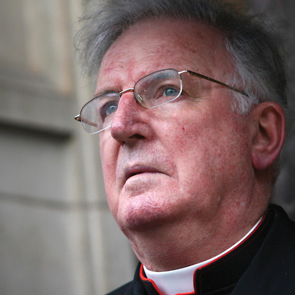 Cardinal Cormac Murphy-O’Connor’s acknowledgement of responsibility in the Michael Hill affair (“Cardinal reflects on clerical sex abuse”, The Tablet, 2 May 2015) contrasts sharply with the evasiveness exhibited by Archbishop Silvano Tomasi in the interview you published on 25 January 2014.
Cardinal Cormac Murphy-O’Connor’s acknowledgement of responsibility in the Michael Hill affair (“Cardinal reflects on clerical sex abuse”, The Tablet, 2 May 2015) contrasts sharply with the evasiveness exhibited by Archbishop Silvano Tomasi in the interview you published on 25 January 2014.
Archbishop Tomasi said that the issue of child abuse involved “the men and women of the church”, Cardinal Murphy-O’Connor points fairly and squarely at the men who lead the Church, citing the way in which episcopal authority was exercised; Archbishop Tomasi went on to blame some conveniently vague entity which he called “public culture,” the Cardinal acknowledges that “the problem was in the Church.” He does not try to shift the blame, saying clearly that “I was very wrong”, the Michael Hill affair was the result of “my decision”.
While I am thankful for the refreshing candour of the cardinal’s statement, I see two further questions which cry out for answers in this whole issue of the Church’s handling of abuse of children by its clergy.
The first is, why the Church was able to develop such a degree of institutional deafness to Christ’s unequivocal condemnation of such behaviour (Matthew 18:6-7). The cardinal tells us that at the forefront of his mind was the care of the priests of his diocese. I welcome the admission, but still want to know how it came about that he, and so many of his brother bishops, have been so oblivious to Christ’s words on the subject, the meaning of which is plain for all to see.
The second question concerns the role of the Holy Spirit throughout this affair. Cardinal Murphy-O’Connor does not say whether he ever prayed for guidance, nor in the many revelations that had been made in recent years have I seen any reference to other Bishops seeking guidance through their prayers. Did any of them seek the guidance of the Holy Spirit when faced with the problem of dealing with abusive priests, or did they imagine that they could cope perfectly adequately without divine help? If they did pray for guidance, what guidance was offered? And to what extent was it followed?
Bernard Whelan, Farnham, Surrey
Cardinal Cormac’s honesty in his memoir gives us a telling insight into the mindset of the hierarchy. It shows there has been a tendenct amongs bishops to act principally as pastors of the clergy in their dioceses. This is borne out recently by the sending of a detailed questionnaire to clergy and a very bland one to the laity. Bishops and, I would say, many diocesan priests, seem to be unaware of the deep suffering among many of the laity, who have experienced family breakdown. Just as Cardinal Cormac came to realise the “deep anguish and distress” of victims of clerical paedophiles, I believe that if the clergy listened to the experiences of the divorced/remarried, they would refrain from talking about “a long penitential pathway” to receiving the Sacraments (Cardinal Nichols). Dear brother priests, priest read the Gospels, pray to the risen Lord and listen to your flock. Do you want the Church to be a bastion of moral superiority or a community of loved and forgiven sinners?
Margaret Guye, St Leonards-on-Sea, East Sussex


 Loading ...
Loading ...